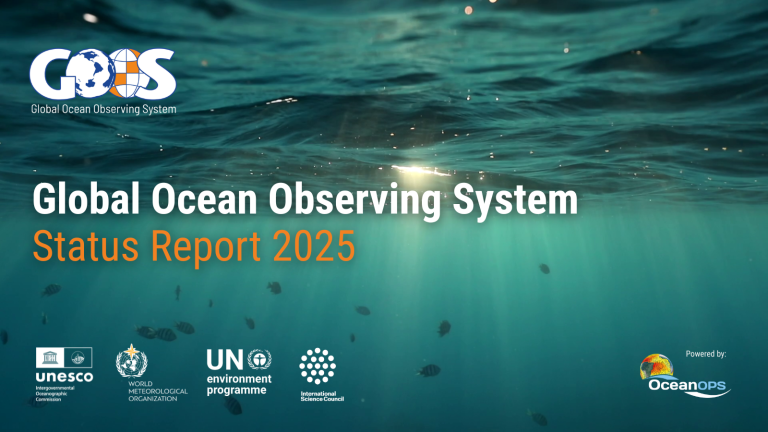A new report shows advances in ocean observing for climate resilience, operational services, ocean health, and sustainable economies - yet warns that without stronger, coordinated investment and more diversified partnerships, this vital observing system and the services it underpins remain subcritical and at risk.
Ocean observations play a crucial role in accurate climate projections, weather and extreme event forecasts, timely early warnings, biodiversity conservation and sustainable ocean economy. The Global Ocean Observing System (GOOS) Status Report 2025 , released today, shows both progress and vulnerabilities in the global capacity to deliver the essential information required to address growing societal needs and protect our ocean in a changing planet.
GOOS, led by the Intergovernmental Oceanographic Commission (IOC) of UNESCO, leads and coordinates the global system of sustained ocean observations. This new, interactive report offers an up-to-date overview of the global ocean observing system and its observing networks monitored by OceanOPS, the joint World Meteorological Organization and IOC operational centre of GOOS. The report also shares stories that explain how ocean observations are guiding science and policy, as well as helping us respond to some of the major challenges facing our ocean today.
The report highlights global efforts to strengthen the capacity to monitor the ocean, adapt to a changing climate, improve operational services, and safeguard ocean health - all of which underpin sustainable ocean economies and the safety and well-being of societies worldwide.
Key highlights include:
- Progress and gaps in predicting the Atlantic Meridional Overturning Circulation - the ocean current system that impacts our climate;
- Using ocean data to improve El Niño forecasts and early warning systems in South America;
- How elephant seals are collecting first-of-its-kind data to support Southern Ocean management and conservation;
- Building South Africa's ocean observing capacity through co-design with local community and other stakeholders;
- A new initiative to transform 10,000 commercial vessels into real-time meteorological and oceanographic observatories.

A critical, yet fragile system
"The "eyes" of thousands of observing platforms feed weather forecasts, early warnings and climate prediction. They are critical to monitor ocean health and our changing climate. Better forecasts and better decision-making depend on robust data. This is a must," says WMO Secretary-General Celeste Saulo.
"Without a resilient and coordinated global observing system, the information we rely on every day becomes uncertain, and so does our future," says Vidar Helgesen, IOC Executive Secretary.
Despite the advances to date, the GOOS Status Report 2025 also warns that the global ocean observing system remains subcritical, with uneven coverage, declining drifting buoy and ship-based observations, and heavy reliance on a small number of contributors. The report calls for long-term, coordinated investment by governments as well as stronger engagement with the private sector to secure a resilient and future-ready system.
"Faced with the fragility of the observing system and the constraints of decreasing budgets, we must innovate through stronger partnerships. This is why we are deepening our collaboration with the shipping industry - to harness the potential of these new partners and expand the automation and scale of ship-based observations," says Mathieu Belbeoch, OceanOPS Manager.
"A new economic mindset is needed for GOOS: one that ensures long-term, coordinated investment in ocean observing as a shared global critical infrastructure - securing its future and unlocking its full potential for people and the planet," says Joanna Post, GOOS Director.
The 2025 GOOS Status Report presents a refreshed, interactive format that makes information on ocean observations and the state and value of the ocean observing system more accessible to decision-makers and the public alike. It calls on governments, funders, and partners to work together in strengthening the backbone for met-ocean information needed for a resilient future.
About GOOS
The Global Ocean Observing System (GOOS) provides leadership and coordination for a global system of sustained ocean observations, based on a set of Essential Ocean Variables. It is the foundation for data-driven solutions for weather and extreme event forecasting, climate adaptation, coastal and maritime risk responses, biodiversity stewardship, and sustainable ocean economies. Through a globally integrated infrastructure of ocean observing networks, national and regional observing initiatives, and with the guidance of its expert panels, GOOS ensures the delivery of essential ocean information that supports ecosystems, economies, and communities worldwide. GOOS is a programme led by the Intergovernmental Oceanographic Commission (IOC) of UNESCO, and co-sponsored by the World Meteorological Organization (WMO), UN Environmental Programme (UNEP) and the International Science Council (ISC).
About OceanOPS
Since 2000, OceanOPS has been the international hub and centre of excellence that provides vital services in monitoring and coordinating an expanding network of global oceanographic and marine meteorological observing communities, under GOOS. Based in Brest, this joint WMO/IOC centre oversees the coordination, monitoring and harmonisation of 10 000 in situ marine meteorological platforms, including the Argo network - with nearly 4 000 autonomous underwater profilers launched since its inception - as well as the network of fixed and drifting buoys, the piloted profilers, and the research and voluntary vessels dedicated to met-oceanographic observations. Its 8-person team also develops web-based tools to monitor the status of the GOOS and its evolution.
About IOC
The Intergovernmental Oceanographic Commission (IOC) of UNESCO promotes international cooperation in marine sciences to improve management of the ocean, coasts, and marine resources. The IOC enables its 152 Member States to work together by coordinating programmes in capacity development, ocean observations and services, ocean science, tsunami warning, and ocean literacy. The work of the IOC contributes to the mission of UNESCO to promote the advancement of science and its applications to develop knowledge and capacity, key to economic and social progress and the basis of peace and sustainable development. The IOC is the entity in charge of coordinating the UN Decade of Ocean Science for Sustainable Development 2021-2030 (The Ocean Decade).






